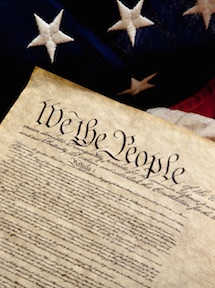By Amelia Harrington
On December 5, 1776, six months after the Declaration of Independence was signed, a group of five students from the College of William and Mary met for the first time as a newly formed secret society in the Apollo Room of the Old Raleigh Tavern. Among these five students was John Heath, the group’s first president, who envisioned a society devoted to the pursuit of liberal education and intellectual fellowship. They named the society Phi Beta Kappa, the Greek initials of their motto, “Love of learning is the guide of life.”
Nearly 240 years later, in March 2016, Mercer University’s Thomas C. and Ramona E. McDonald Center for America’s Founding Principles hosted its Fourth Annual Elliott Conference on Great Books and Ideas. The theme: “1776.” It was only appropriate that the opening lecture, “Lincoln and the Daughters of Dred Scott: A Reflection on the Declaration of Independence,” was given by Phi Beta Kappa member and scholar Diana Schaub, a confluence that called attention to the close relation shared between the beginnings of the United States of America, and its most prestigious honor society, Phi Beta Kappa.
Schaub is a professor of political science at Loyola University Maryland and author of Erotic Liberalism: Women and Revolution in Montesquieu’s “Persian Letters” (Rowman & Littlefield,1995). She has also written book chapters, articles, essays, and reviews in the fields of political philosophy and American political thought that have appeared in the New Criterion, Commentary, the Claremont Review of Books, and elsewhere. Schaub earned her Bachelor’s degree summa cum laude from Kenyon College, where she was inducted in 1980 by the Beta of Ohio chapter of Phi Beta Kappa; she received her MA and PhD from the University of Chicago and was a postdoctoral fellow of the Program on Constitutional Government at Harvard University from 1994 to 1995. In 2001 she received the Richard M. Weaver Prize for Scholarly Letters, and from 2004 to 2009 she served as a member of the President’s Council on Bioethics. At Princeton University, she was the Garwood Teaching Fellow for the 2011-2012 academic year.
This year’s Elliott conference was the largest to date, with eleven visiting scholars and four Mercer University students presenting lectures and panels during the two-day event. In addition to Diana Schaub’s opening lecture, Phi Beta Kappa members Adam Potkay (ΦBK, Cornell University, 1991), professor at the College of William and Mary, and James Read (ΦBK, University of Chicago, 1980), political science professor at St. John’s University, presented original research. Read’s presentation “The Public Mind Shall Rest: Lincoln, Public Opinion, and the Ultimate Extinction of Slavery,” part of the “Context and Legacy” panel, offered a glimpse of the extensive reverberations that the events of 1776 sent into the next centuries.
“The ideas and principles articulated in this year reach back to antiquity yet are largely responsible for making the world in which we live,” professor and University Center co-director Will R. Jordan said to Mercer News about the theme “1776.”
Such reverberations were explored by scholars at the conference but could also be seen in the conference itself. Members of Phi Beta Kappa are part of an unbroken tradition established in 1776; their presentations at this Fourth Annual Elliott Conference on Great Books and Ideas served to continue the tradition of intellectual fellowship, underlining the significance of 1776 for liberal education and life as we know it.
Amelia Harrington is a junior at Randolph College majoring in English literature and dabbling in everything else. Randolph College is home to the Delta of Virginia Chapter of Phi Beta Kappa.




